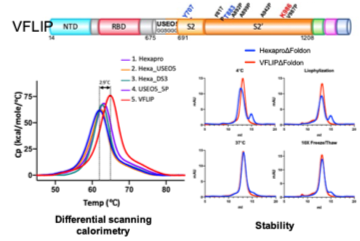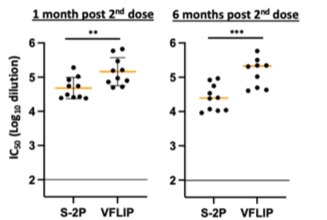SARS-COV-2 Spike Stabilization Technology “VFLIP” for SARS-COV-2 and Other Human Betacoronaviruses
Investigator(s):
 Erica Ollmann Saphire, Ph.D.
La Jolla Institute for Immunology
Erica Ollmann Saphire, Ph.D.
La Jolla Institute for Immunology
Categories:
Infectious Disease
Virology
Vaccines
A better stabilized antigen could provide a superior vaccine candidate to elicit longer-lasting, protective immune responses
In the last 20 years, multiple coronaviruses (CoVs) have emerged to cause outbreaks of serious human disease. Scientists in the Saphire Lab at La Jolla Institute for Immunology (LJI) are working to prepare broad neutralizing antibodies that can prevent not only the infectivity of existing CoVs, such as SARS-CoV-2, but also future CoV variants.
To achieve a third-generation vaccine and produce a tool for diagnostics and structural analyses, the Saphire Lab undertook successful engineering of a thermostable glycoprotein spike. This novel construct is termed VFLIP, for (V-five) Flexibly-Linked, Inter-Protomer spike.
The new VFLIP structure is an important tool for devising more effective CoV vaccines and diagnostics. Compared with the viral structures used in the first-generation COVID-19 vaccines, VFLIP is closer in structure to the Spike protein found in the real SARS-CoV-2 with more accurate glycan coat and improved binding profiles to hundreds of therapeutic mAbs. The researchers engineered VFLIP using a different pattern of proline mutations, adjusted subunit linkages and introduction of a disulfide bond in the inner core to preserve the quaternary assembly of the pre-fusion state.
These improvements have made VFLIP more stable and better at triggering a robust immune response than earlier S-2P or Hexapro versions of spike. The VFLIP format is successful for variants of SARS-CoV-2, SARS-COV-1 and other human CoVs. This work will support a rapid response to future coronavirus outbreaks.

VFLIP’s structure makes it stable, prefusion and trimeric at room temperature for at least 28 days.
Mice immunized with VFLIP showed a potent elicitation of neutralizing antibodies against homologous and heterologous SARS-CoV-2 variants of concern. VFLIP also induce a long-lasting neutralizing antibody protection compared to the first-generation SARS-CoV-2 vaccines based on the S-2P stabilization, turning VFLIP as a promising vaccine candidate.
